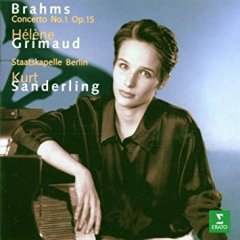Brahms - Piano Concerto No.1 Op.15 D Minor (Grimaud) [1998]
Brahms - Piano Concerto No.1 Op.15 D Minor (Grimaud) [1998]

1 Maestoso 23:50 2 Adagio 13:27 3 Rondo - Allegro Non Troppo 12:43 Hélène Grimaud - piano Staatskapelle Berlin Kurt Sanderling - conductor This disc received the 1999 Cannes Classical Award for "Best Solo with Orchestra - 19th/20th Century."
Wow! This is one hell of a performance! Grimaud has fought hard during her career not to be typecast as a "French" pianist doomed to spend her life playing cute little concertos by Saint-Saëns and keyboard fluff by Satie, and with this performance she really throws down the gauntlet. This is as classically Germanic a performance as you're likely to hear: rock solid, moderate tempos, a gorgeously modulated piano sonority, and a view of the music that perfectly balances passion with classical discipline. She is helped in no small measure by Sanderling, one of the great Brahms conductors of our day, and also by a live recording that catches the whole inspirational event on the wing. This is one of the great ones, make no mistake. --David Hurwitz, Editorial Reviews
This powerhouse of a concerto can withstand a number of approaches, given its combination of drama and lyricism. Ms. Grimaud has taken it on with the objective of exploring its more hidden treasures. It's rare for a record collector of 35 years to hear a fresh approach to such a classic (i've heard Serkin/Szell; Fleisher/Szell; Kovacevich/Sawallisch; Cliburn/Leinsdorf and Gilels/Boehm and found great value in the approach of each, but this recording, made in performance in Berlin's Schauspielhaus is something quite special. In her jacket notes, she states her understanding of the piece as a response on Brahms' part to the incredible drama he faced at the loss of his best friend and mentor Robert Schumann due to mental illness (likely he was bi-polar) and his eventual death. This explains the intense craggy drama of the opening movement followed by the lovely resignation of the slow movement and the restored life-affirmation of the finale. There is likely a great deal of the composer's fondness for Clara Schumann in the slow movement. His unrequited love for her shows itself in a number of his piano works, not least of all the opus 119 pieces.
She takes, like Gilels and Gould, an extremely slow tempo in the first movement, balancing its dramatic and lyric elements beautifully while allowing the conductor, Sanderling, the opportunity to distinguish various inner voices and explore various instrumental balances and sonorities in long held passages and chords. The recording balance is amazingly good for an "in-performance" recording. The orchestra which serves in the pit of the Berlin Staatsoper is well accustomed to providing accompaniment, playing with a smooth blended sound that while not quite up to the high standard of the Berlin Philharmonic will still do quite nicely.
The slow movement plays like a meditation with various soloists in the orchestra responding intimately and spontaneously to the pianist. After all the slow reflection of the first two movements, the finale is played at a more conventional lively tempo in keeping with the pianist's interpretation of this concerto as a kind of requiem expressing resolution and life affirmation at its end.
The overall perspective of the recording gives a sense of being somewhat recessed in mid hall with a nicely blended sound as opposed to surgical detail. That may be why some reviewers note the subdued timpani and horns, although I find the conductor has given them sufficient prominence. It's simply a more central-european approach. I highly recommend this to those who love this concerto and wish to explore various approaches to it. This one is quite unusual but rewarding in what it reveals. I note some complaints about the conductor but Grimaud chose him particularly for this concert and recording based on prior collaboration and admits in her notes, that she was fortunate in that he agreed with her on the slow tempo interpretation of the opening movement. Get it if you can. Warner does a poor job of distributing its classical recordings in the U.S. Perhaps you can find it used on amazon or perhaps even a budget rerelease will appear. Don't hold your breath for the latter. ---W. Chiles, amazon.com
download (mp3 @320 kbs):








